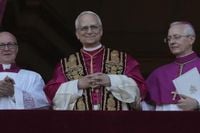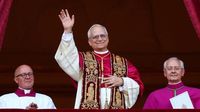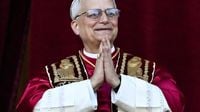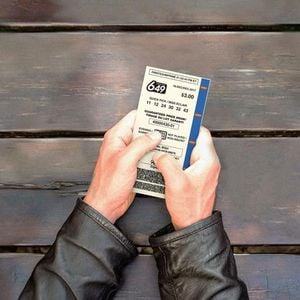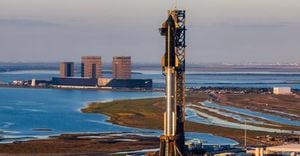VILLANOVA, Pa. (WPVI) -- Cardinal Robert Prevost has made history by being elected as the first American pope, taking the name Pope Leo XIV. At 69 years old, Prevost has strong ties to the Philadelphia region, having graduated from Villanova University with a Bachelor of Science degree in mathematics in 1977. His election was marked by a plume of white smoke emerging from the temporary chimney atop the Sistine Chapel, signaling that the 133 cardinals present had reached a two-thirds majority to elect the new leader of the Catholic Church.
On Thursday, May 8, 2025, as bells rang at St. Peter's Basilica, crowds cheered in celebration of the announcement. Pope Leo XIV delivered his first Apostolic Urbi et Orbi blessing shortly after stepping out onto the balcony in papal vestments. His authority and jurisdiction began immediately upon acceptance of the office, which is customary for newly elected popes.
Prevost’s election came during the third round of conclave voting, and he was the only U.S. cardinal on a short list of candidates, known as "papabiles," compiled after the death of Pope Francis. Father James Martin, a papal contributor to ABC News, noted that Prevost began to emerge as a front-runner in the days leading up to the conclave.
Born in Chicago, Prevost joined the Order of Saint Augustine right after graduating from Villanova. He later obtained a Master of Divinity degree from the Catholic Theological Union in Chicago in 1982, the same year he was ordained as a priest. His career has largely been spent in Peru, where he worked as a teacher, missionary, and parish priest.
In 2014, Pope Francis appointed him as the bishop of Chiclayo, Peru, and in April 2020, he became the apostolic administrator of the diocese of Callao. Since 2023, he has served as the Prefect of the Dicastery for Bishops, a role that involves overseeing bishop nominations worldwide. His previous experience includes leading the Augustinian seminary in Trujillo, Peru, and teaching canon law.
In an interview with Vatican News in October 2024, Pope Leo XIV emphasized the importance of humility in leadership, stating that "a bishop is not supposed to be a little prince sitting in his kingdom, but rather called authentically to be humble, to be close to the people he serves, to walk with them and to suffer with them." He has also expressed progressive views on the Catholic principle of synodality, which promotes listening to the needs of the community.
Prevost's election is particularly significant as it marks a shift in the Vatican's traditional hesitancy to select a pope from a superpower like the United States, often viewed as too secular by some conservative factions within the Church. His dual citizenship in both the U.S. and Peru may have helped alleviate concerns about his nationality.
The crowd in St. Peter’s Square erupted in cheers when the white smoke signaled a successful election, with many waving flags from around the world. The atmosphere was electric, as priests made the sign of the cross and nuns wept in joy. The cheers of "Viva il papa!" echoed through the square as thousands awaited the announcement of the new pope.
Pope Leo XIV’s election comes at a time when the Catholic Church faces numerous challenges, including addressing issues of social justice, inclusivity, and the need for greater connection with the laity. His background as a missionary and educator may provide a unique perspective for navigating these issues.
In a 2023 interview with the Catholic News Service, Prevost discussed the importance of bishops working in communion with the Holy Father and the necessity of listening to the diverse voices within the Church. He stated, "The spirit of synodality includes a need and desire to listen to not only the bishop himself, but to many people in the diocese to see what's the best way to promote authentic church in each and every diocese in the world."
As the new pope, Leo XIV faces the task of uniting a church with over 1.4 billion members worldwide, reflecting a diverse range of cultural backgrounds and theological perspectives. His centrist approach, combined with progressive views on certain issues, may help bridge gaps within the Church.
The conclave that led to his election was marked by intense deliberation among cardinals from 70 nations, emphasizing the global nature of the Catholic Church. The selection of Prevost as pope signals a commitment to inclusivity and a recognition of the shifting demographics of Catholicism, particularly as the faith continues to grow in regions such as Africa.
As Pope Leo XIV embarks on his papacy, many are hopeful that his leadership will bring a renewed focus on social justice and a deeper connection with the faithful. The world will be watching closely to see how he addresses the pressing issues facing the Church in the coming years.
Pope Leo XIV's election is not only a historic moment for the Catholic Church but also for the Philadelphia area and Villanova University, which proudly boasts its connection to the new pontiff. With a rich background in education and community service, many believe he will strive to uphold the values of compassion and humility that are central to the Church's mission.
As the first American pope, Leo XIV represents a significant milestone in the Vatican's history, and his journey from Villanova to the papacy is a testament to the influence of education and faith in shaping leaders for the future.
